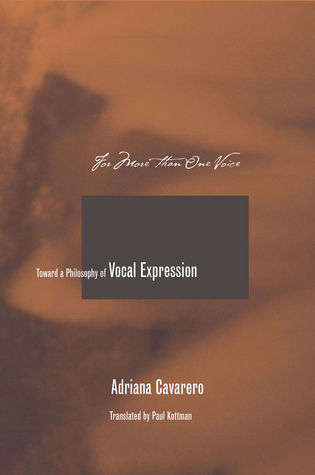
Feminist philosophy translated from Italian. Since ancient Greece, philosophy in the West has been predominantly centred on thought and on the visual, the semantic, the disembodied, the Said, and the reified. Cavarero begins from the observation that, when we speak, prior to whatever content is conveyed by our words, the singular character of the speaker’s voice communicates their embodied uniqueness. This, she argues, is the starting point for a new philosophy that prioritizes the aural, the relational, the embodied, and the Saying, and a new way of thinking about politics which begin from our mutual recognition as unique, physical, doing entities rather than primarily as minds or, as so much of our world from the most erudite philosopher to the basest of political actors treats other humans, as things.
I like where this book ends up. An engagement with the world that is embodied, relational, anti-reificatory, and premised on the primacy of reciprocal recognition of unique selves (and, dare I say it, dignity?) is very appealing. Of course, it stops short of doing much exploration of what it might look like in practical theory and politics today, and I’m not sure I’m 100% convinced that the figure at the centre of the book – the uniqueness of the voice – is actually borne out by material experience. I’m also not sure that beginning from the heart of classical philosophy is really the most relevant-to-me way of getting at new ways of engaging with the world – which is not to disrespect the work that she has done here, but rather to evaluate it from the position of my own goals and projects.
In addition to those reservations, it also feels like truly evaluating the path she takes to get from her initial premise to the appealing conclusions would require me to know a lot more, and hence to read a lot more, about the various components she makes use of along the way. I’ve read a little Plato, Levinas, and Arendt over the years, but not nearly enough to assess how she’s using them; I know nothing about opera and only know Cixous and Kristeva by reputation; and my one attempt to read Nancy was, shall we say, not successful. I suspect the ways she differentiates between the visual and the vocal would be transformed and enriched (though not necessarily entirely invalidated) by an engagement with Deaf Studies. I’m not sure how to reconcile the 20th century European sex-difference-focused feminism that she sometimes draws on with the somewhat different strand of feminist thinking that feels most politically relevant to me in early 21st century North America. And so on.
And yet, it was an interesting journey that pushed me to learn about new things and that did indeed leave me with a few useful ideas for my own current work that is thinking, in a much less philosophical register than this, about listening.
(And on a more personal note: This book was a gift from one of my sisters for Xmas. She and I are both quite private about our respective work and don’t tend to talk about it much, but I only realized after I started reading it that this is a book that manages to be relevant to things that both of us do. Which I quite appreciate.)
Originally posted by Scott on Goodreads.